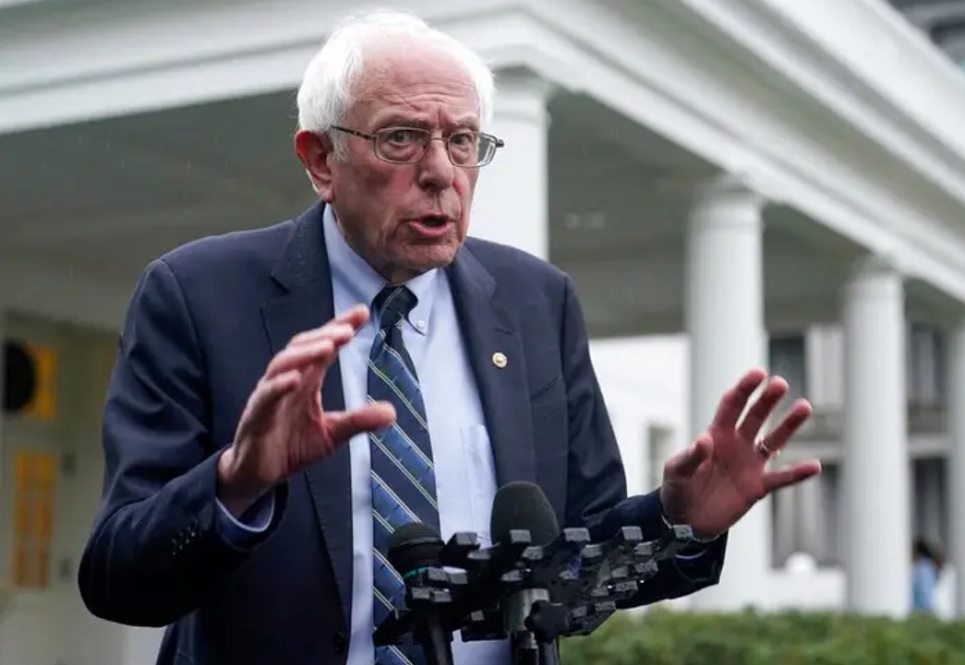
WASHINGTON—Saying 28 million U.S. workers would get a pay raise, Sen. Bernie Sanders, Ind-Vt., plus 29 other senators, introduced legislation to raise the federal minimum wage to $17 an hour by 2028, and entirely eliminate the so-called “tipped minimum wage,” raising those workers to minimum-wage status over seven years.
The measure builds on the long “Fight for 15 and a union” campaign. But corporate greed and business hatred for paying workers, especially workers of color, decent wages have prevented a nationwide hike for years. The “15” is now outdated.
Sanders, Congress’s senior advocate for workers and chair of the Senate committee that deals with workers issues, will set a hearing on that side of Capitol Hill. The Republican-run House is another matter, although there was no immediate Republican reaction to the measure, introduced July 25. That panel’s top Democrat, Rep. Bobby Scott of Virginia, introduced the wage hike there.
The federal minimum wage has been $7.25 an hour since 2009 and at least 23 states, plus dozens of cities, are tired of waiting for Congress to act. They raised minimum wages on their own—even in some red states. But in others—Alabama is a prime example—the state minimum wage is still at $7.25, and when “blue” cities raised minimums, the white right-wing Republican state legislative majorities repealed their right to do so.
Sanders called the current federal minimum “a starvation wage.” Two years ago, AFL-CIO President Liz Shuler, in a Labor Day in the pulpit address, called it “pathetic.”
“It must be raised to a living wage–at least $17 an hour,” Sanders declared. “In the year 2023, a job should lift you out of poverty, not keep you in it.
“At a time of massive income and wealth inequality and record-breaking corporate profits, we can no longer tolerate millions of workers being unable to feed their families because they are working for totally inadequate wages. Congress can no longer ignore the needs of the working class of this country. The time to act is now.”
Scott agreed, declaring, “Raising the minimum wage is good for workers, good for business, and good for the economy. When we put money in the pockets of American workers, they will spend that money in their communities.”
The AFL-CIO, AFSCME, the Teachers (AFT), the Communications Workers, Jobs with Justice, the National Domestic Workers Alliance, the National Education Association, the Restaurant Opportunities Center, the Service Employees, the Steel Workers, and Workers Circle promptly endorsed the legislation.
So did workers’ allies, such as the National Employment Law Project and the National Partnership for Women and Families. The Economic Policy Institute did, too—and pointed out that in much of the country, $17 an hour already isn’t enough to live on.
Sanders’s legislation would immediately raise the federal minimum wage to $$9.50 hourly, then raise it in steps to $17 an hour in 2028. After that, it would grow, percentage-wise, with the growth in median wages for the entire workforce. The median is the point where half of all workers are above and half are below.
“A $17 minimum wage by 2028 would generate $86 billion in higher wages for workers and would also benefit communities across the country. Because underpaid workers spend much of their extra earnings, this injection of wages will help stimulate the economy and spur greater business activity and job growth,” EPI says.
“Low wages hurt all workers and are particularly harmful to Black workers and other workers of color, especially women of color, who make up a disproportionate share of workers who are severely underpaid. This is the result of structural racism and sexism, with an economic system rooted in chattel slavery in which these workers continue to be shunted into the most underpaid jobs,” it adds.
The tipped minimum wage has been stuck at $2.13 per hour since 1991, thanks to corporate lobbies, notably the National Restaurant Association, whose members hold the distinction of being by far the lowest-paying sector of the U.S. economy.
Other tipped minimum workers include bellhops, cabbies, and domestic workers. Sixty percent of U.S. minimum wage workers are adult women, NELP says. That makes the common corporate claim that a minimum wage hike benefits mostly high-schoolers working summer jobs an outright lie.
In a statement, the restaurant lobby said its members—in so many words—can’t afford to raise their workers’ pay. Congressional Republicans, who kowtow to corporate interests, including opposing raising the minimum wage, are silent so far.
We hope you appreciated this article. At People’s World, we believe news and information should be free and accessible to all, but we need your help. Our journalism is free of corporate influence and paywalls because we are totally reader-supported. Only you, our readers and supporters, make this possible. If you enjoy reading People’s World and the stories we bring you, please support our work by donating or becoming a monthly sustainer today. Thank you!










